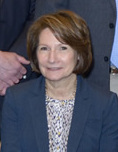Janice E. Clements facts for kids
Quick facts for kids
Janice Ellen Clements
|
|
|---|---|
 |
|
| Nationality | American |
| Alma mater | University of Maryland, College |
| Scientific career | |
| Fields | Virology |
| Institutions | Johns Hopkins University |
Janice Ellen Clements is an important scientist at Johns Hopkins University. She is a professor who studies tiny living things called viruses. Her research focuses on how certain viruses, called lentiviruses, can cause brain and nerve problems. She also helps lead the faculty at the Johns Hopkins School of Medicine.
Contents
Becoming a Scientist: Janice Clements' Journey
Janice Clements earned her PhD in biochemistry from the University of Maryland. This means she studied the chemistry of living things. After that, she did special research at Johns Hopkins University in the 1970s. She worked with other famous scientists like Bernard Weiss and Opendra Narayan.
Starting Her Career at Johns Hopkins
In 1978, Dr. Clements became a professor at Johns Hopkins. She worked in the Department of Neurology. By 1990, she became a full professor. She was the 24th woman to reach this high rank at the Johns Hopkins School of Medicine.
Leading a New Department
Dr. Clements joined a group that studied how diseases affect animals in 1988. She led their virus lab starting in 1992. She worked hard to make this group a full department. In 2002, she became the first director of this new department. It was later named the Department of Molecular and Comparative Pathobiology.
Helping Other Scientists
In 2000, Dr. Clements took on another big role. She became the vice dean for the School of Medicine. This meant she helped manage the school's faculty. She stepped down as department director in 2008. Her colleague, Chris Zink, took over from her.
Exploring Viruses: Dr. Clements' Research
Dr. Clements has done a lot of research on many different viruses. She mainly focuses on animal lentiviruses. These are a special type of retrovirus. The human immunodeficiency viruses (HIV-1 and HIV-2) are also lentiviruses.
Discovering How Lentiviruses Work
Dr. Clements was the first to map out the complex genetic code of lentiviruses. She described the structure of the visna virus, which affects sheep. She also did similar work on the caprine arthritis encephalitis virus (CAEV) in goats.
Connecting Animal Viruses to Human Health
When AIDS was discovered, scientists learned it was caused by HIV. Dr. Clements' work became even more important. In 1985, she published an article with Robert Gallo, who helped discover HIV. This article showed that HIV was a lentivirus, like visna virus. Before this, some thought it was a different type of virus.
Her work also suggested that HIV might have come from animals. Later, scientists found that HIV likely came from simian immunodeficiency virus (SIV) in chimpanzees and monkeys.
Studying HIV and Finding New Treatments
Dr. Clements has done a lot of research on SIV and HIV. Her lab has published over 160 scientific papers. With her team, she has studied how the body fights retrovirus infections. They use animal models to understand HIV encephalitis, a brain problem caused by HIV.
Her recent work includes using minocycline, a common medicine, to help protect against viral brain infections. This medicine can also slow down how fast viruses copy themselves. Dr. Clements and her team have also created ways to study where HIV hides in the body. This helps scientists understand how to fight the virus better.
Supporting Women in Science
Dr. Clements is a strong supporter of women in science. She works to create more chances and helpful environments for women in universities. She is part of the Johns Hopkins Women's Leadership Council.
Celebrating Women Professors
In 2005, the Johns Hopkins School of Medicine celebrated a big milestone. The 100th woman was promoted to full professor. Dr. Clements helped organize this special event. It honored Mary Elizabeth Garrett, whose gift helped the school start in 1893. Garrett believed in equal chances for everyone in medical education. She said that women and men should both be able to study medicine and earn awards.

